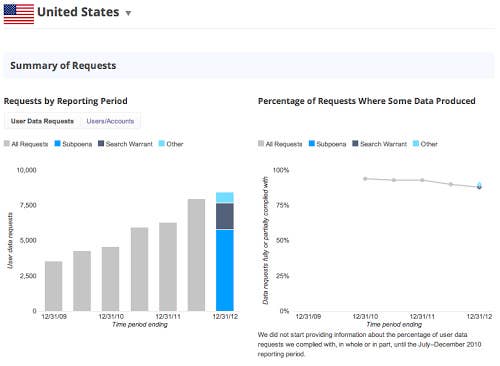A breakdown of law enforcement's requests for Google user information.

Google new transparency report shows a steady and dramatic rise in law-enforcement requests from the data giant, an increasing share of them done through subpoenas.
While in the first half of 2009, Google received just 12,359 requests — with 3,580 coming from inside the U.S. — in the second half of 2012, it received 21,389 worldwide, with 8,476 requests in the U.S, a trend likely due to law enforcement's increased interest and savvy in mining online data.
Google's new report also offers a breakdown of the sorts of requests made.
Between July and December 2012, 68 percent of the data requests were made with a subpoena, required for information such as the name associated with the Gmail account, the IP address where it was created, and the dates and times of when the user signed in and out. Search warrants, requiring a judge's approval based on "probable cause," were used in 22 percent of requests, to obtain the non-content portion of email heads such as the "from," "to" and "date" fields. Only 10 percent were due to "other processes," mainly court orders, which are necessary for getting stored content such the contents of a Gmail account.
Google told Buzzfeed that they were even more transparent with this report because they "recently updated our system for tracking demands so that we could more easily generate reports based on the type of legal process." There have been instances in which Google received a subpoena and refused to hand over information. However, Google says their data on such instances is incomplete. "We haven't gone back to verify if we received subpoenas for data that could be compelled only through a warrant during this particular reporting period," says Google spokesperson.
The U.S. continues to be the government that generates the most requests. Its 8,476 requests for information targeted 14,868 U.S users. Second to the U.S. were requests from India at 2,431, followed by France at 1,693 requests, and Germany at 1,550 requests.
